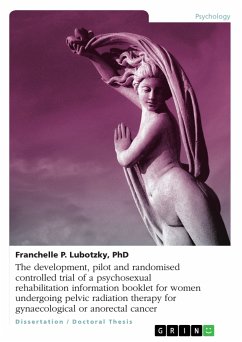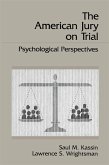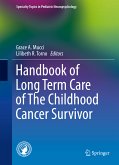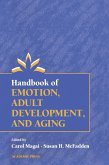Doctoral Thesis / Dissertation from the year 2015 in the subject Psychology - Clinical Psychology, Psychopathology, Prevention, grade: Pass, The University of Sydney (The Centre for Medical Psychology and Evidence-based Decision Making, School of Psychology), course: PhD, language: English, abstract: Thias study entailed the development (Phase I), pilot (Phase II) and randomised controlled trial (RCT) (Phase III) of a psychosexual information booklet for women undergoing pelvic radiation therapy (PRT) for gynaecological or anorectal cancer. This was undertaken due to the high prevalence of psychosexual morbidity following PRT, and the lack of existing resources to facilitate recovery and reduce distress. The psychosexual information booklet was developed based on the literature, input from an expert multi-disciplinary advisory group, and published standards in developing information materials for cancer consumers. After the booklet development, a mainly qualitative retrospective pilot study was conducted which explored: a) women’s experiences and rehabilitation informational needs following PRT; b) the feasibility and acceptability of providing women with an information booklet about radiation-induced side effects potentially affecting recovery, and especially sexual functioning/vaginal changes; and c) assessed the acceptability of a measurement protocol that would be used in a later RCT. The pilot highlighted many challenges to quality of life faced by women after PRT, and revealed diverse informational needs, particularly regarding sexual rehabilitation. Overall, the pilot findings provided support for the provision of a psycho-educational resource to better support women in physical and psychosexual rehabilitation following PRT, as well as some guidance regarding improving the format of the booklet. The pilot booklet was revised based on participant feedback, as well as the recent Cochrane Review (Johnson & Miles, 2010) findings regarding vaginal dilator use. Given the high levels of acceptability of the pilot psychosexual booklet, its effectiveness was then prospectively evaluated in a multicentre randomised controlled trial (RCT). The longitudinal quantitative RCT assessed whether the psychosexual booklet improved adherence to recommended rehabilitation strategies (dilator use, vaginal lubrication and pelvic floor muscle exercises), improved knowledge, lowered levels of anxiety, depression and PRT-related psychological distress and improved sexual activity, function and satisfaction post PRT. The RCT demonstrated that the psychosexual booklet improved knowledge and vaginal dilator use.
Bitte wählen Sie Ihr Anliegen aus.
Rechnungen
Retourenschein anfordern
Bestellstatus
Storno









